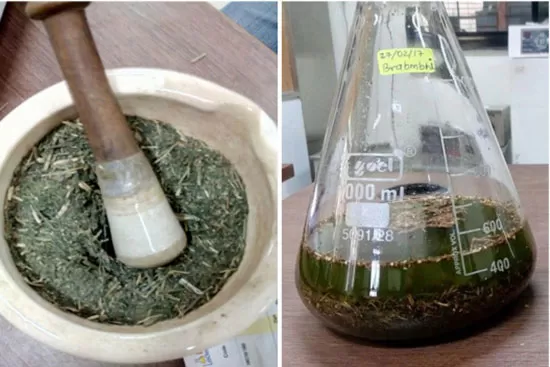- 0086-571-85302990
- sales@greenskybio.com
Scientific Insights: Research Studies Confirming the Efficacy of Grape Seed Extract
2024-08-13

1. Introduction
Grape Seed Extract has emerged as a subject of great interest in recent years. It is derived from the seeds of grapes, a fruit that has been cultivated for thousands of years for various purposes, including winemaking. However, it is only in recent times that the potential health benefits of Grape Seed Extract have been extensively studied. This extract is rich in polyphenols, particularly proanthocyanidins, which are believed to be responsible for many of its beneficial effects. The aim of this article is to explore the scientific research that has been carried out to confirm the efficacy of Grape Seed Extract in various aspects, including its anti - inflammatory effects, impact on cognitive function, and its role in combating certain diseases.

2. Anti - Inflammatory Effects of Grape Seed Extract
2.1. Inflammatory Response and Health
Inflammation is a natural response of the body's immune system to injury or infection. However, chronic inflammation can lead to a host of health problems, such as cardiovascular diseases, arthritis, and certain cancers. The body's inflammatory response involves the activation of various immune cells and the release of inflammatory mediators like cytokines and prostaglandins. When this response becomes dysregulated and persists over time, it can cause damage to tissues and organs.
2.2. Grape Seed Extract and Inflammation
- Several research studies have shown that grape seed extract has significant anti - inflammatory properties. For example, in vitro studies have demonstrated that the polyphenols in grape seed extract can inhibit the production of inflammatory cytokines. These cytokines, such as interleukin - 6 (IL - 6) and tumor necrosis factor - alpha (TNF - α), play key roles in the development and progression of chronic inflammatory diseases.
- Animal studies have also provided evidence of the anti - inflammatory effects of grape seed extract. In models of arthritis, treatment with grape seed extract has been shown to reduce joint swelling and inflammation. This is thought to be due to its ability to modulate the immune response in the joints, suppressing the activation of inflammatory cells.
- In human studies, some research has indicated that grape seed extract supplementation may be beneficial for individuals with inflammatory conditions. For instance, in a small - scale study on patients with inflammatory bowel disease, those who took grape seed extract supplements showed a reduction in symptoms related to inflammation in the gut.

3. Impact of Grape Seed Extract on Cognitive Function
3.1. Cognitive Function and Aging
As people age, cognitive function often declines. This can manifest as problems with memory, attention, and decision - making. There are several factors that contribute to this decline, including oxidative stress, inflammation, and the accumulation of amyloid - beta plaques in the brain, which are associated with Alzheimer's disease. Maintaining good cognitive function is crucial for quality of life, and there is an increasing interest in finding natural substances that can support brain health.
3.2. Grape Seed Extract and Brain Health
- Research on the impact of grape seed extract on cognitive function has yielded promising results. In vitro studies have shown that the antioxidants in grape seed extract can protect brain cells from oxidative damage. Oxidative stress is known to be a major factor in neurodegenerative diseases, and by reducing it, grape seed extract may help preserve the integrity of brain cells.
- Animal studies have demonstrated that grape seed extract can improve cognitive performance in aged animals. These studies have used various behavioral tests, such as maze - running tasks, to measure cognitive abilities. The results suggest that grape seed extract may enhance memory and learning in animals, possibly by promoting the growth of new neurons or by improving synaptic function in the brain.
- Human studies are also being conducted to explore the effects of grape seed extract on cognitive function. Some preliminary studies have reported that supplementation with grape seed extract may be associated with improved memory and attention in older adults. However, more large - scale, long - term studies are needed to confirm these findings.

4. Grape Seed Extract in Combating Certain Diseases
4.1. Cardiovascular Diseases
Cardiovascular diseases are a leading cause of death worldwide. Risk factors for these diseases include high blood pressure, high cholesterol levels, and inflammation. Grape seed extract has been studied for its potential role in preventing and treating cardiovascular diseases.
- Studies have shown that grape seed extract can improve endothelial function. The endothelium is the inner lining of blood vessels, and its proper function is essential for maintaining normal blood flow and preventing the development of atherosclerosis. Grape seed extract has been found to increase the production of nitric oxide in the endothelium, which helps relax blood vessels and reduce blood pressure.
- It also has lipid - lowering effects. In some research, grape seed extract has been shown to reduce levels of LDL cholesterol (the "bad" cholesterol) and triglycerides in the blood. By improving lipid profiles, it may contribute to a lower risk of developing cardiovascular diseases.
- Furthermore, the anti - inflammatory properties of grape seed extract may play a role in reducing the risk of cardiovascular diseases. Chronic inflammation is associated with the development of atherosclerotic plaques, and by suppressing inflammation, grape seed extract may help prevent the progression of these plaques.
4.2. Cancer
Cancer is a complex and heterogeneous group of diseases characterized by uncontrolled cell growth. While the idea that grape seed extract can be used to treat cancer is still in the realm of research, there have been some interesting findings.
- In vitro studies have shown that grape seed extract can inhibit the growth of cancer cells. The polyphenols in the extract are thought to interfere with the cell cycle of cancer cells, preventing their proliferation. For example, in studies on breast cancer cells, grape seed extract has been shown to induce cell cycle arrest and apoptosis (programmed cell death).
- Animal studies have also provided some evidence of the anti - cancer potential of grape seed extract. In some animal models of cancer, treatment with grape seed extract has been associated with a reduction in tumor size. However, it should be noted that the translation of these findings from animals to humans is not straightforward, and more research is needed.
- There are also some early - stage human studies exploring the use of grape seed extract in cancer treatment. Some of these studies have investigated the use of grape seed extract as an adjunct to traditional cancer therapies, such as chemotherapy. The idea is that it may enhance the effectiveness of these therapies while reducing their side effects.

5. Conclusion
In conclusion, scientific research has provided substantial evidence for the efficacy of grape seed extract in various aspects. Its anti - inflammatory effects, potential impact on cognitive function, and possible role in combating certain diseases make it a promising natural substance for health promotion. However, more research is still needed, especially large - scale, long - term human studies, to fully understand its mechanisms of action and to determine the optimal dosages for different applications. As our understanding of grape seed extract continues to grow, it may become an increasingly important component of preventive and therapeutic strategies in the field of health and medicine.
FAQ:
What are the anti - inflammatory mechanisms of grape seed extract?
Grape seed extract contains compounds such as proanthocyanidins. These compounds can modulate the body's inflammatory response pathways. They may inhibit the production of inflammatory mediators like cytokines and prostaglandins. By reducing the levels of these pro - inflammatory substances, grape seed extract can help to decrease inflammation at a cellular and systemic level.
How does grape seed extract affect cognitive function?
Studies suggest that grape seed extract may have positive effects on cognitive function through multiple mechanisms. It has antioxidant properties that can protect neurons from oxidative stress, which is often associated with cognitive decline. Additionally, it may improve blood flow to the brain, ensuring that neurons receive an adequate supply of oxygen and nutrients. Some research also indicates that it could modulate neurotransmitter levels, which are crucial for proper brain function.
Can grape seed extract prevent or treat specific diseases?
There is evidence to suggest that grape seed extract may play a role in preventing or treating certain diseases. For example, in cardiovascular diseases, its antioxidant and anti - inflammatory properties may help reduce the risk factors such as high blood pressure and cholesterol levels. In diabetes, it may improve insulin sensitivity. It also shows potential in some types of cancer prevention by interfering with cancer cell growth and proliferation, although more research is needed to fully understand these effects.
What is the optimal dosage of grape seed extract for health benefits?
The optimal dosage of grape seed extract can vary depending on factors such as the individual's age, health status, and the specific health goal. In general, dosages in research studies have ranged from a few hundred milligrams to several grams per day. However, it is important to consult a healthcare professional before starting any supplementation to ensure safety and effectiveness, as high doses may have potential side effects.
Are there any side effects associated with grape seed extract?
While grape seed extract is generally considered safe for most people, some individuals may experience side effects. These can include mild gastrointestinal issues such as nausea, stomach upset, or diarrhea. In rare cases, allergic reactions may occur. People who are taking medications should also be cautious, as grape seed extract may interact with certain drugs, such as blood - thinning medications.
Related literature
- The Efficacy of Grape Seed Extract in Inflammatory Disorders"
- "Grape Seed Extract and Cognitive Health: A Review of the Scientific Evidence"
- "Grape Seed Extract in Disease Prevention: Current Research and Future Perspectives"
- ▶ Hesperidin
- ▶ citrus bioflavonoids
- ▶ plant extract
- ▶ lycopene
- ▶ Diosmin
- ▶ Grape seed extract
- ▶ Sea buckthorn Juice Powder
- ▶ Beetroot powder
- ▶ Hops Extract
- ▶ Artichoke Extract
- ▶ Reishi mushroom extract
- ▶ Astaxanthin
- ▶ Green Tea Extract
- ▶ Curcumin Extract
- ▶ Horse Chestnut Extract
- ▶ Other Problems
- ▶ Boswellia Serrata Extract
- ▶ Resveratrol Extract
- ▶ Marigold Extract
- ▶ Grape Leaf Extract
- ▶ blog3
- ▶ blog4
- ▶ blog5
-
What are extracts made of?
2024-08-13
-
Extract Usage: A Comprehensive Guide
2024-08-13
-
Are plant extracts good for you?
2024-08-13
-
What are plant-based extracts?
2024-08-13
-
What Is a Plant Extract? A Deep Dive
2024-08-13
-
Agaricus Blazei Extract
2024-08-13
-
Citrus bioflavonoids
2024-08-13
-
Marigold Extract
2024-08-13
-
Apricot Powder
2024-08-13
-
Rosemary extract
2024-08-13
-
melatonin extract
2024-08-13
-
Pine bark Extract Powder
2024-08-13
-
Sophora Japonica Flower Extract
2024-08-13
-
Selenium yeast
2024-08-13
-
Polygonum multiflorum extract
2024-08-13































